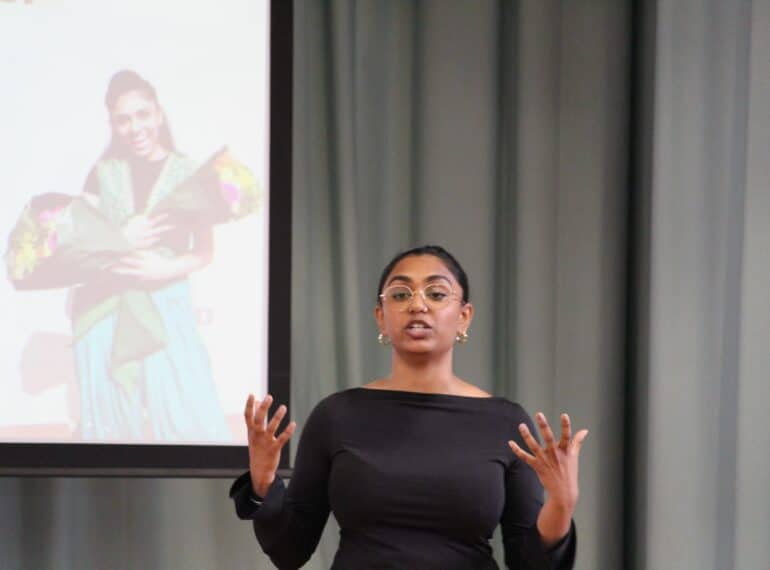
Young theatre director and writer Neetu Singh’s story drew rapt attention from Lower School boys when she visited as part of the QE Futures programme.
 Still aged only 24, Neetu founded Haldi, a collective for South Asian artists, while an English Literature undergraduate at Oxford and is now studying towards a Master’s in Creative Writing at Cambridge.
Still aged only 24, Neetu founded Haldi, a collective for South Asian artists, while an English Literature undergraduate at Oxford and is now studying towards a Master’s in Creative Writing at Cambridge.
Her most recent work was as Assistant Director of The Cherry Orchard, directing the Bush Company’s 14–17 Young Company at the Donmar Warehouse in Covent Garden. The production of Chekhov’s masterpiece, which wowed the critics, finished its successful run on Saturday.
Assistant Head (Pupil Destinations) James Kane described her talk, given in a special assembly to Years 8 and 10 in the Main School Hall, as a “real highlight” of the term’s Lower School QE Futures activities. “Being from a south Asian heritage, she was able to relate to many of our students here at QE.
“Neetu spoke eloquently about the difficulties in constantly having to find work as a creative, saying that although there are many benefits, it is very stressful, particularly since she has financial responsibilities at home. Our boys really enjoyed seeing an alternative creative career prospect being executed well by someone who is young and relatable, and we will see how this impacts them in years to come when they graduate and enter the world of work.”
During her talk, she referenced working with actors Riz Ahmed and Adeel Akhtar, names many of the boys recognised from the satirical comedy film, Four Lions. Adeel played Lopakhin, one of the leading characters, in The Cherry Orchard.
She described the change from seeing these actors on screen as a child to then graduating and learning how to have the confidence to reach out to them and see if she could work with them.
Neetu’s CV as a writer and director features: being an alumna of the Squint Playwriting Award and Young Vic’s Fresh Direction Programme; assistant directing credits including Kabul Goes Pop with Brixton House, Noor with Kali Theatre and Run, Rebel with Pilot Theatre; and directing credits including Tako at the Camden People’s Theatre, Coconut at the Edinburgh Fringe, and Brown Girl Noise at the Camden Fringe.
 She came to the School as part of QE Futures – a programme launched this year which aims to guide every pupil towards competitive degree-level university or apprenticeship courses and then to help them thrive both at university and beyond.
She came to the School as part of QE Futures – a programme launched this year which aims to guide every pupil towards competitive degree-level university or apprenticeship courses and then to help them thrive both at university and beyond.
Other events organised this term by QE Futures Co-ordinator Nathan Lawson (pictured above with Neetu) included an assembly talk to Year 10 from Evangeline Addai-Gyimah, a lawyer-turned-broadcaster, about working in television. Evangeline, a Law graduate, joined Sky last year and works in sports broadcasting.
She also supported the School in February by speaking to boys at the Year 11 Careers Convention (pictured).

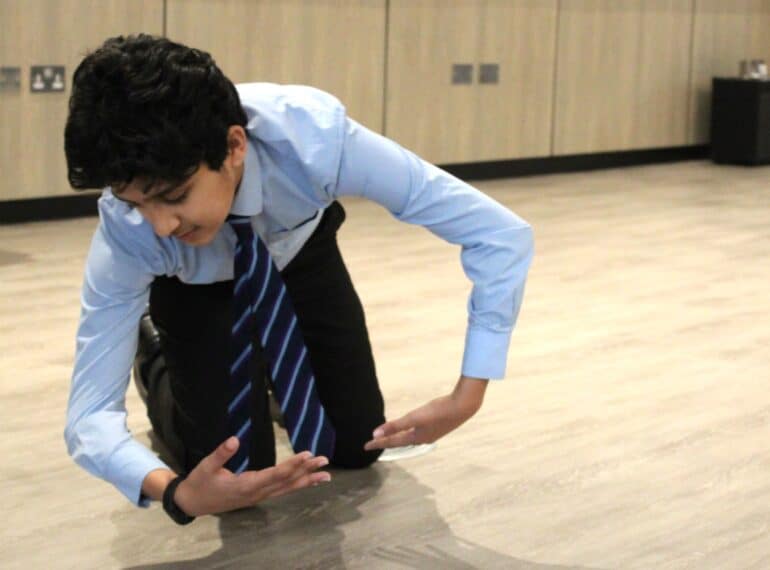
 Vihaan, pictured here and top, delivered the speech from Romeo and Juliet given by Romeo as he lay dying – giving a repeat of his performance in School, which was praised for its maturity and sensitivity.
Vihaan, pictured here and top, delivered the speech from Romeo and Juliet given by Romeo as he lay dying – giving a repeat of his performance in School, which was praised for its maturity and sensitivity. “We were therefore delighted to host two rounds of the competition. Although Vihaan did not progress through the regional final, he did very well to make it through the semi-finals and is to be congratulated on a series of accomplished performances.
“We were therefore delighted to host two rounds of the competition. Although Vihaan did not progress through the regional final, he did very well to make it through the semi-finals and is to be congratulated on a series of accomplished performances. The boys were judged not only on their physical performance and their vocalisation, but on how far their performance suited the speech, and how far their interpretation of the speech met their artistic intention.
The boys were judged not only on their physical performance and their vocalisation, but on how far their performance suited the speech, and how far their interpretation of the speech met their artistic intention. Ms Shah praised the work that the QE boys put into their performances. “I was amazed by the vulnerability of some of these speeches and the maturity and sensitivity with which they were delivered. These qualities were particularly obvious in the speech of our winner Vihaan, who chose Romeo’s last speech to Juliet. He conjured Juliet’s body out of thin air with his delivery of Shakespeare’s words, and his choice of a vulnerable speech was a brave one.”
Ms Shah praised the work that the QE boys put into their performances. “I was amazed by the vulnerability of some of these speeches and the maturity and sensitivity with which they were delivered. These qualities were particularly obvious in the speech of our winner Vihaan, who chose Romeo’s last speech to Juliet. He conjured Juliet’s body out of thin air with his delivery of Shakespeare’s words, and his choice of a vulnerable speech was a brave one.”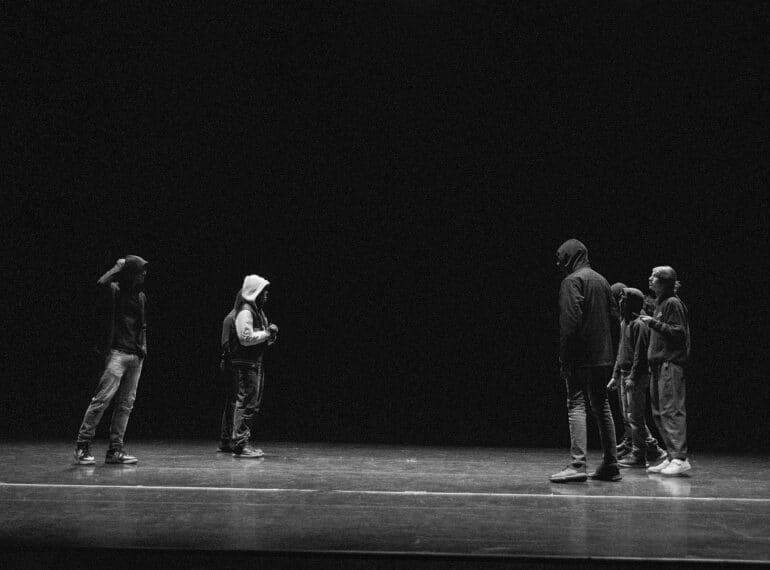
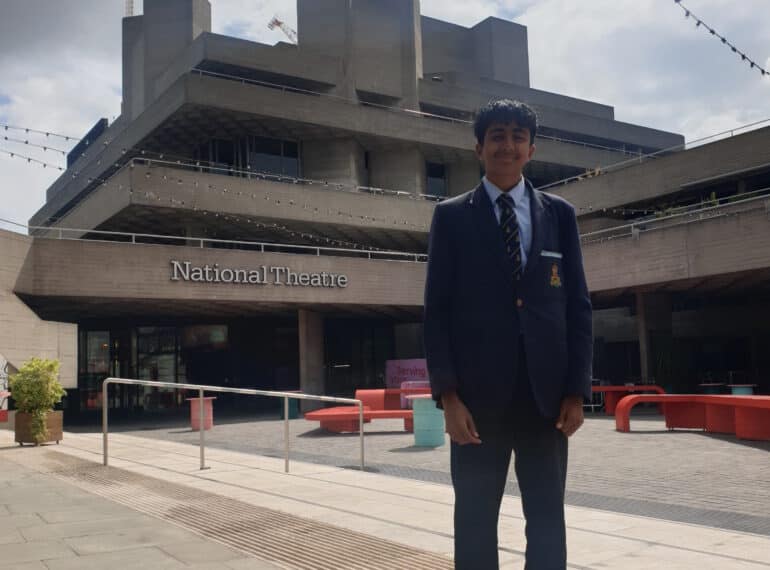
 Head of English Robert Hyland said: “Many congratulations to Adithya for a wonderful achievement. For someone as young as him to produce such a powerful piece of writing is truly astonishing – and for a student to have their work performed at the National Theatre is unprecedented in the School’s history.
Head of English Robert Hyland said: “Many congratulations to Adithya for a wonderful achievement. For someone as young as him to produce such a powerful piece of writing is truly astonishing – and for a student to have their work performed at the National Theatre is unprecedented in the School’s history.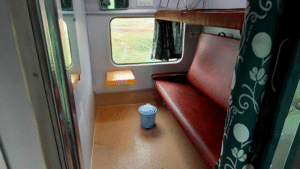 His play was a philosophical and reflective story about a British-Indian teenager taking a train ride across southern India after his mother’s death, and the relationship he developed both with his father and with the country of India.
His play was a philosophical and reflective story about a British-Indian teenager taking a train ride across southern India after his mother’s death, and the relationship he developed both with his father and with the country of India.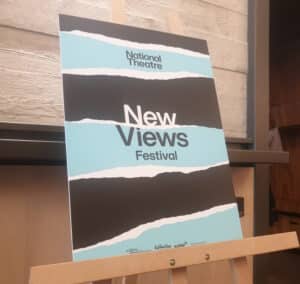 Adithya’s mentor, Andrew Muir, has had plays produced throughout the UK and in recent years his work has been performed at the National Theatre’s Connections festival, at Soho Theatre and on the BBC. His assessment of Adithya’s play described it as “a joyous road trip of a story, in which both father and son are brought back together again following the devastating loss of their wife and mother respectively.
Adithya’s mentor, Andrew Muir, has had plays produced throughout the UK and in recent years his work has been performed at the National Theatre’s Connections festival, at Soho Theatre and on the BBC. His assessment of Adithya’s play described it as “a joyous road trip of a story, in which both father and son are brought back together again following the devastating loss of their wife and mother respectively.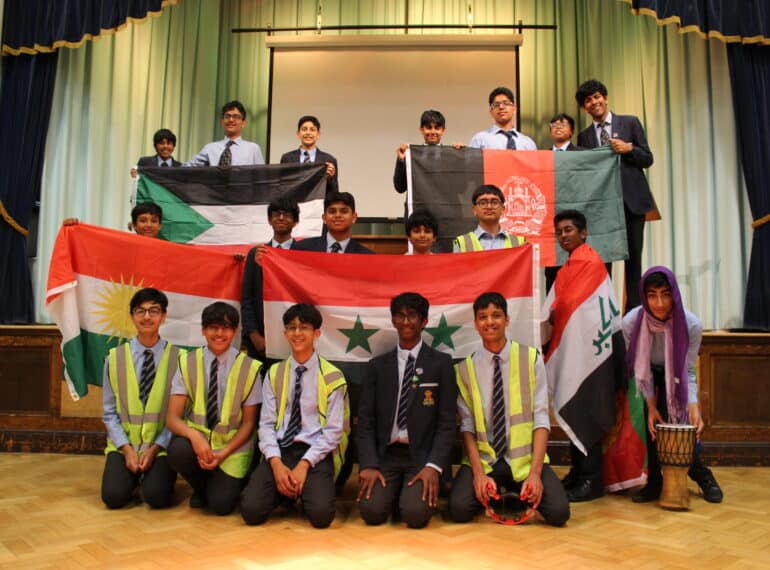
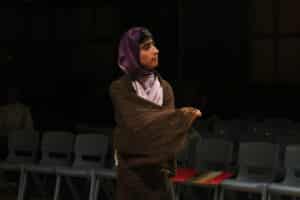 Performed during national Refugee Week, the play, which is itself called The Jungle, gave a voice to some of the thousands of men, women and children from many different countries who lived in the camp while trying to gain access to the UK.
Performed during national Refugee Week, the play, which is itself called The Jungle, gave a voice to some of the thousands of men, women and children from many different countries who lived in the camp while trying to gain access to the UK.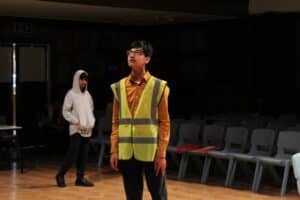 An award-winning play, The Jungle was written by two young playwrights, Joe Murphy and Joe Robinson, who met while studying English at Oxford. In the autumn of 2015, they first came to the Jungle camp, returning a short time later after crowdfunding to bring an 11m white geodesic dome there to serve as a theatre and community & arts space. They then spent seven months volunteering in the Jungle, before the authorities took down the encampment in 2016.
An award-winning play, The Jungle was written by two young playwrights, Joe Murphy and Joe Robinson, who met while studying English at Oxford. In the autumn of 2015, they first came to the Jungle camp, returning a short time later after crowdfunding to bring an 11m white geodesic dome there to serve as a theatre and community & arts space. They then spent seven months volunteering in the Jungle, before the authorities took down the encampment in 2016. Aahan said: “Playing the role of someone who has been far less privileged than myself and has had many different experiences has been really interesting. Additionally, the character I played weaves himself in and out of the story, as if controlling it and the perspective, which was something really challenging but also really fun!”
Aahan said: “Playing the role of someone who has been far less privileged than myself and has had many different experiences has been really interesting. Additionally, the character I played weaves himself in and out of the story, as if controlling it and the perspective, which was something really challenging but also really fun!”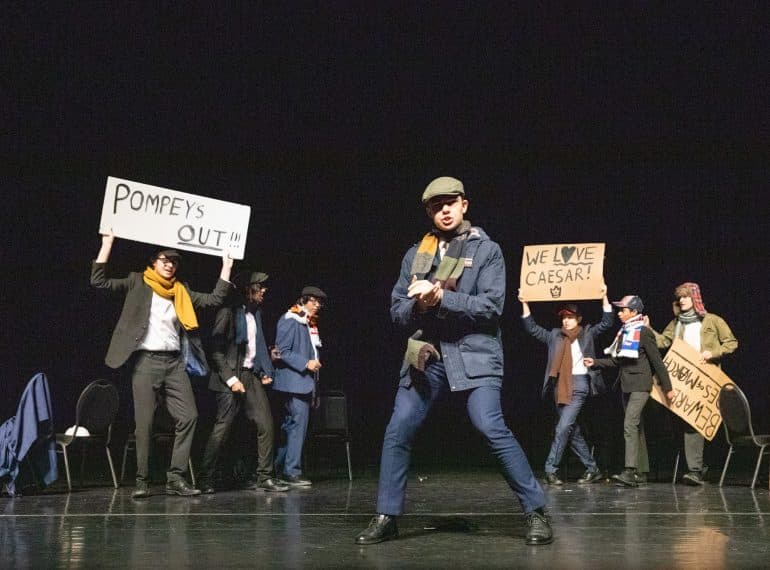
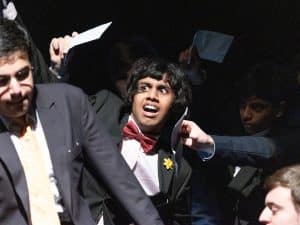 The boys put on Julius Caesar at North Finchley’s artsdepot in the Shakespeare Schools Festival and then twice in School to Years 9 and 11 as part of QE’s inaugural Shakespeare and Latin Festival.
The boys put on Julius Caesar at North Finchley’s artsdepot in the Shakespeare Schools Festival and then twice in School to Years 9 and 11 as part of QE’s inaugural Shakespeare and Latin Festival.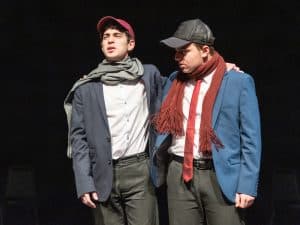 “Many congratulations should go to the whole cast and crew, as the actors allowed some of Shakespeare’s most famous lines to shine – from Mark Antony and Brutus’ soaring funeral orations to Caesar’s resigned acceptance of his fate,” said Mr Hyland.
“Many congratulations should go to the whole cast and crew, as the actors allowed some of Shakespeare’s most famous lines to shine – from Mark Antony and Brutus’ soaring funeral orations to Caesar’s resigned acceptance of his fate,” said Mr Hyland.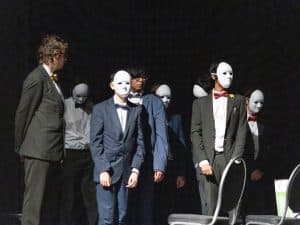 “The students have embraced the themes and the concept, and they have provided more pieces of inspired drama and theatricality than I could have hoped for. For that, and for their general work ethic and insatiable enthusiasm, I thank them,” Mr Lister added.
“The students have embraced the themes and the concept, and they have provided more pieces of inspired drama and theatricality than I could have hoped for. For that, and for their general work ethic and insatiable enthusiasm, I thank them,” Mr Lister added.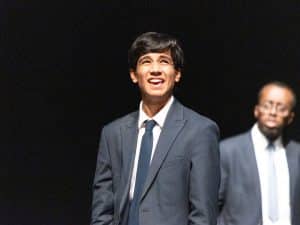 Year 11 actor Uday Dash said: “I had to adapt and build Cassius into a manipulative, calculating character, which was both a challenge and a unique experience.”
Year 11 actor Uday Dash said: “I had to adapt and build Cassius into a manipulative, calculating character, which was both a challenge and a unique experience.”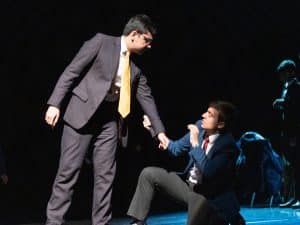 Assistant Head (Pupil Involvement) Crispin Bonham-Carter said: “Dr Pillinger drew out the links between Baz Luhrmann’s film of The Great Gatsby, Fitzgerald’s novel and the ancient Latin text, The Feast of Trimalchio.”
Assistant Head (Pupil Involvement) Crispin Bonham-Carter said: “Dr Pillinger drew out the links between Baz Luhrmann’s film of The Great Gatsby, Fitzgerald’s novel and the ancient Latin text, The Feast of Trimalchio.”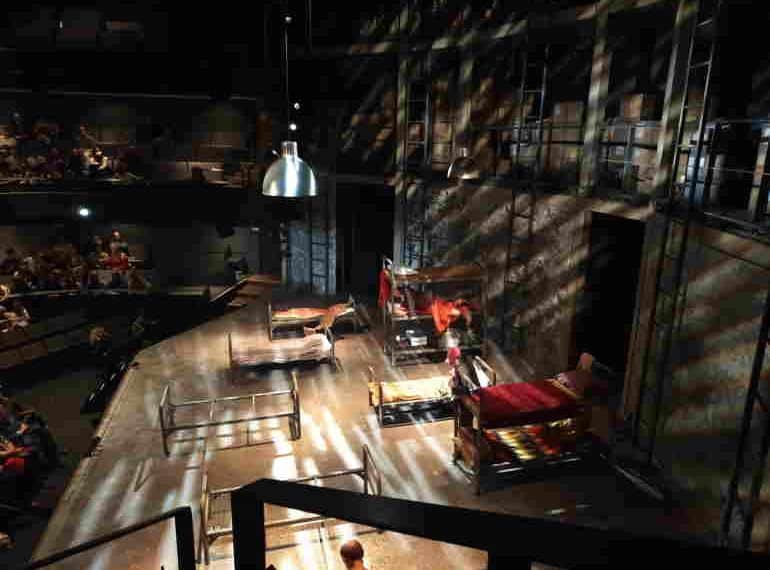
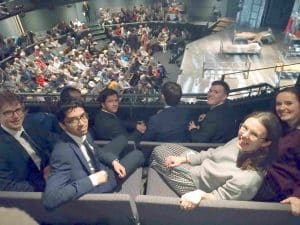 The group of Year 12 and Year 13 German students took the train to Kingston to watch The Caucasian Chalk Circle (Der kaukasische Kreidekreis) in the town’s Rose Theatre.
The group of Year 12 and Year 13 German students took the train to Kingston to watch The Caucasian Chalk Circle (Der kaukasische Kreidekreis) in the town’s Rose Theatre.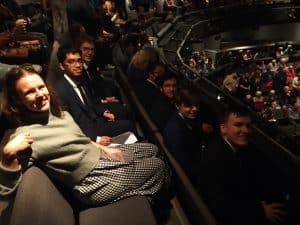 The visit reinforced the boys’ Sixth Form German studies. The Sixth Form course covers Berlin and its cultural scene. Brecht lived and worked in East Berlin for a large part of his career, although The Caucasian Chalk Circle was written in the United States, where Brecht was living in exile during the war.
The visit reinforced the boys’ Sixth Form German studies. The Sixth Form course covers Berlin and its cultural scene. Brecht lived and worked in East Berlin for a large part of his career, although The Caucasian Chalk Circle was written in the United States, where Brecht was living in exile during the war.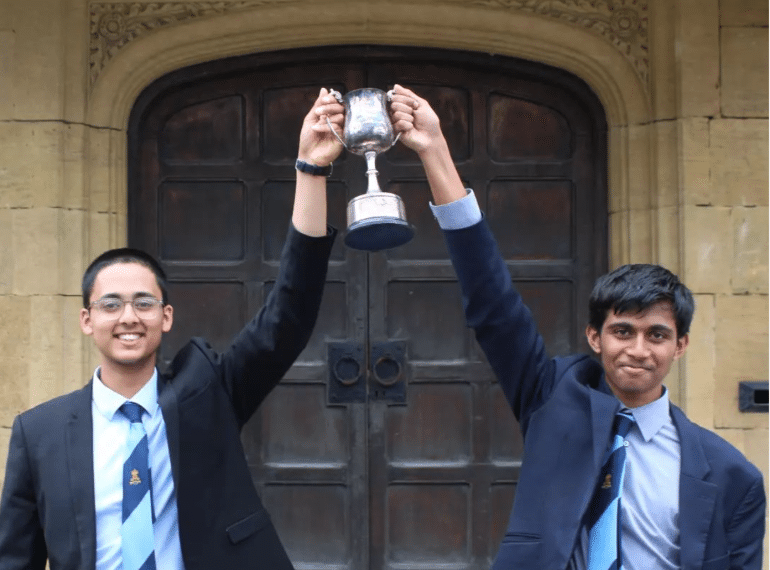
 Headmaster Neil Enright said: “My congratulations go to Harrisons’ House Captain, Utkarsh Bhamidimarri, his deputy, Anubhav Rathore, [both of Year 12] and to all the members of the House. Their impressive victory demonstrates how a combination of unflinching determination, high levels of enthusiastic participation and good organisation can often turn around unpromising situations.”
Headmaster Neil Enright said: “My congratulations go to Harrisons’ House Captain, Utkarsh Bhamidimarri, his deputy, Anubhav Rathore, [both of Year 12] and to all the members of the House. Their impressive victory demonstrates how a combination of unflinching determination, high levels of enthusiastic participation and good organisation can often turn around unpromising situations.” One of the biggest contributors to the overall points total is Sports Day, held near the end of the Summer Term. All The Houses battled hard at Sports Day, including Harrisons’, although this year, as in 2019 and 2021 (2020’s Sports Day being cancelled), the winning House was again Broughton.
One of the biggest contributors to the overall points total is Sports Day, held near the end of the Summer Term. All The Houses battled hard at Sports Day, including Harrisons’, although this year, as in 2019 and 2021 (2020’s Sports Day being cancelled), the winning House was again Broughton. The latter included the 10km sponsored walks undertaken by pupils from Years 7–9, which, like Sports Day, formed part of this year’s QE Enrichment Week.
The latter included the 10km sponsored walks undertaken by pupils from Years 7–9, which, like Sports Day, formed part of this year’s QE Enrichment Week. They slaked their thirst with water delivered to them en route by Assistant Head (Pupil Involvement) Crispin Bonham-Carter and Extra-curricular Enrichment Tutor Katrin Hood, who organised the walks.
They slaked their thirst with water delivered to them en route by Assistant Head (Pupil Involvement) Crispin Bonham-Carter and Extra-curricular Enrichment Tutor Katrin Hood, who organised the walks.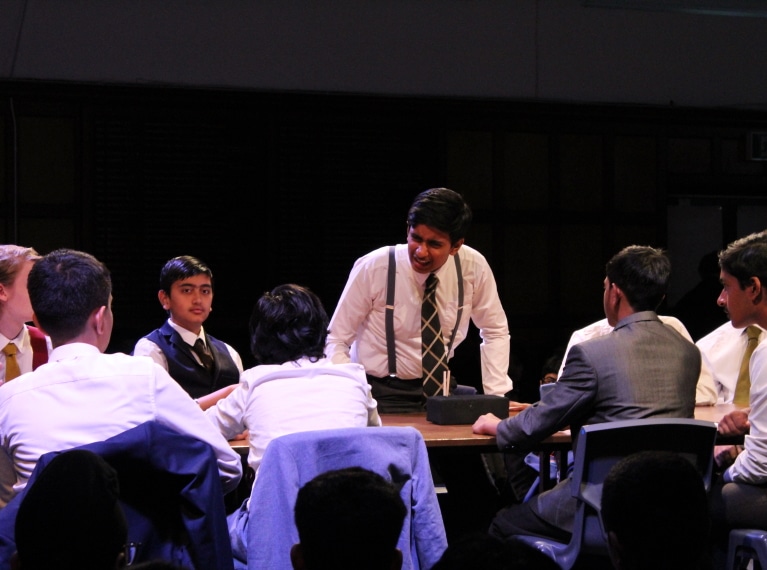
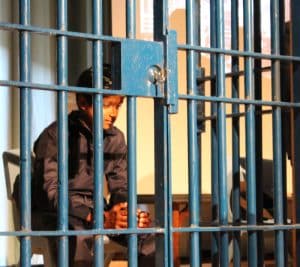 12 Angry Men was written by prolific playwright and TV dramatist Reginald Rose and turned into a critically acclaimed film by multi-award winning director Sidney Lumet. Although penned nearly 70 years ago, the themes of prejudice, race, status and justice still resonate strongly today.
12 Angry Men was written by prolific playwright and TV dramatist Reginald Rose and turned into a critically acclaimed film by multi-award winning director Sidney Lumet. Although penned nearly 70 years ago, the themes of prejudice, race, status and justice still resonate strongly today.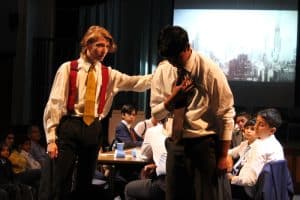 “Augie was a picture of calm, as he gently unpicked the easy assumptions of the other jurors, while the Bhowmick brothers – Krishn and Koustuv, of Years 9 and 10 respectively – were exceptional in their portrayal of embittered, middle-aged jurors 3 and 10,” said Mr Bonham-Carter.
“Augie was a picture of calm, as he gently unpicked the easy assumptions of the other jurors, while the Bhowmick brothers – Krishn and Koustuv, of Years 9 and 10 respectively – were exceptional in their portrayal of embittered, middle-aged jurors 3 and 10,” said Mr Bonham-Carter.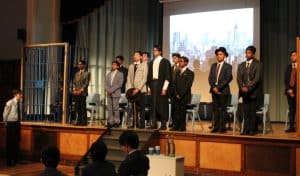 Juror 7, Saim Khan, of Year 10, said: “Drama has been a uniquely amazing experience in that it has enabled me to work closely with people from different year groups. Whilst there have been many challenges such as learning lines, the length of the play and learning cues, it has been immensely rewarding.”
Juror 7, Saim Khan, of Year 10, said: “Drama has been a uniquely amazing experience in that it has enabled me to work closely with people from different year groups. Whilst there have been many challenges such as learning lines, the length of the play and learning cues, it has been immensely rewarding.”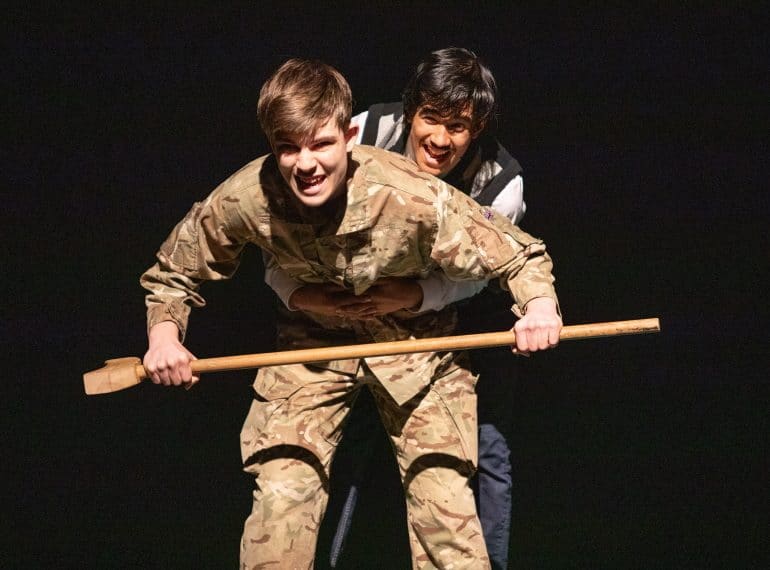
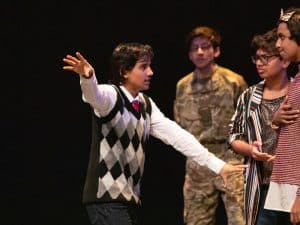 The production of the tragedy, performed during the SSF at the Arts Depot in Finchley and then again in School to Year 11, was a central part of the inaugural QE Shakespeare Festival. This week-long celebration of the works of England’s greatest playwright was brought to an end by an “inspiring” and “hugely entertaining” lecture to Year 10 from John Mullan, a professor of English at University College London.
The production of the tragedy, performed during the SSF at the Arts Depot in Finchley and then again in School to Year 11, was a central part of the inaugural QE Shakespeare Festival. This week-long celebration of the works of England’s greatest playwright was brought to an end by an “inspiring” and “hugely entertaining” lecture to Year 10 from John Mullan, a professor of English at University College London.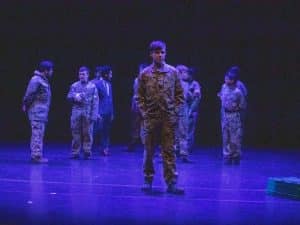 “Our boys’ performance of Othello at the Arts Depot and again at School was a dark journey into the psychology of jealousy and revenge. Patrick Bivol [Year 11] played Iago with a hands-in-pockets insouciance that made his lies and plotting deliciously painful to watch, while Sultan Khokhar [Year 13] gave the Moor [Othello himself] a calm nobility as he met his tragic downfall.
“Our boys’ performance of Othello at the Arts Depot and again at School was a dark journey into the psychology of jealousy and revenge. Patrick Bivol [Year 11] played Iago with a hands-in-pockets insouciance that made his lies and plotting deliciously painful to watch, while Sultan Khokhar [Year 13] gave the Moor [Othello himself] a calm nobility as he met his tragic downfall.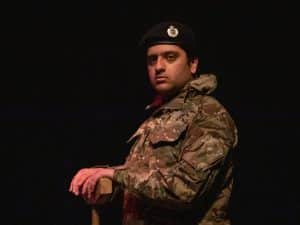 Professor Mullan is a regular TV and radio broadcaster and a literary journalist; he writes on contemporary fiction for The Guardian and was a judge for the 2009 Man Booker Prize.
Professor Mullan is a regular TV and radio broadcaster and a literary journalist; he writes on contemporary fiction for The Guardian and was a judge for the 2009 Man Booker Prize.